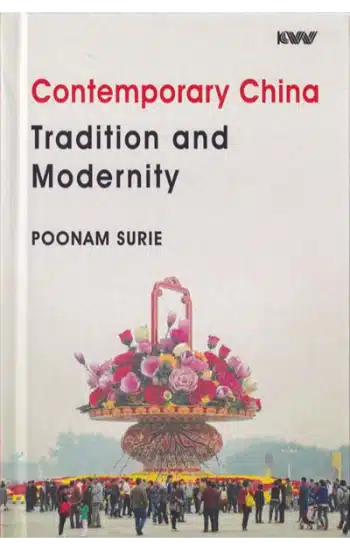
Save: 20%

Save: 30%
Contemporary China: Tradition and Modernity
Publisher:
| Author:
| Language:
| Format:
Publisher:
Author:
Language:
Format:
₹1,380 ₹966
Save: 30%
In stock
Ships within:
In stock
ISBN:
Page Extent:
This book is about contemporary China, relationships and negotiations between State and Society across the realm of tradition and modernity. It is an exploration of societal issues, gender issues and several other concerns, including environmental goals and theimpact of religious beliefs in China. China has not only evolved in terms of its economy, but has made its mark in the world in many other ways. Becoming a global manufacturing hub,
with supply chains, increasing trade and commerce, success in poverty alleviation, all have
added to the success story. Contemporary China is a complex amalgamation of political ideologies which are centered on the power of the leadership and capitalism with Chinese characteristics, wherein the private sector is curtailed by political factors and controlled by the Party in various ways. Religion is also a factor which plays a role in making people aware of their traditions and philosophies, but at the same time is being used by the Party
as a control mechanism. The ideologies which are being talked about by the leadership
are Marxism with Chinese characteristics, socialism with Chinese characteristics and the rule of law, again with Chinese characteristics, not to forget its version of grass roots democracy and nationalism, which talks about the state for the people and people for the
state. However, there is a complex relationship between the Party and society and constant negotiations are a part of the warp and weft of the Party state.
China has been trying to go into a consumption led growth, rather than continue to depend on exports and infrastructure development. However, new challenges have emerged and to ensure that China can continue to grow at a fast pace on a sustainable basis and to reduce dependence on external technology, the focus has shifted to innovation and domestic technology development, including in all futuristic domains such as AI, Quantum, Cyber, Robotics, green energy, etc. This book delves into several aspects of the foundation of contemporary Chinese society, the realms across the wider horizons and its commonalities across the terrain and the historical and cultural connections with its neighbour, India
This book is about contemporary China, relationships and negotiations between State and Society across the realm of tradition and modernity. It is an exploration of societal issues, gender issues and several other concerns, including environmental goals and theimpact of religious beliefs in China. China has not only evolved in terms of its economy, but has made its mark in the world in many other ways. Becoming a global manufacturing hub,
with supply chains, increasing trade and commerce, success in poverty alleviation, all have
added to the success story. Contemporary China is a complex amalgamation of political ideologies which are centered on the power of the leadership and capitalism with Chinese characteristics, wherein the private sector is curtailed by political factors and controlled by the Party in various ways. Religion is also a factor which plays a role in making people aware of their traditions and philosophies, but at the same time is being used by the Party
as a control mechanism. The ideologies which are being talked about by the leadership
are Marxism with Chinese characteristics, socialism with Chinese characteristics and the rule of law, again with Chinese characteristics, not to forget its version of grass roots democracy and nationalism, which talks about the state for the people and people for the
state. However, there is a complex relationship between the Party and society and constant negotiations are a part of the warp and weft of the Party state.
China has been trying to go into a consumption led growth, rather than continue to depend on exports and infrastructure development. However, new challenges have emerged and to ensure that China can continue to grow at a fast pace on a sustainable basis and to reduce dependence on external technology, the focus has shifted to innovation and domestic technology development, including in all futuristic domains such as AI, Quantum, Cyber, Robotics, green energy, etc. This book delves into several aspects of the foundation of contemporary Chinese society, the realms across the wider horizons and its commonalities across the terrain and the historical and cultural connections with its neighbour, India
About Author
Reviews
There are no reviews yet.
Related products
The RSS: 100 Years of Service, Dedication and Nation Building
Save: 15%
The Republic Relearnt: Renewing Indian Democracy 1947-2024
Save: 25%
RELATED PRODUCTS
The Republic Relearnt: Renewing Indian Democracy 1947-2024
Save: 25%
Fallout: Power, Intrigue And Political Upheaval In Pakistan
Save: 15%
The RSS: 100 Years of Service, Dedication and Nation Building
Save: 15%
No Land s People: The Untold Story of Assam s NRC Crisis
Save: 67%



Reviews
There are no reviews yet.